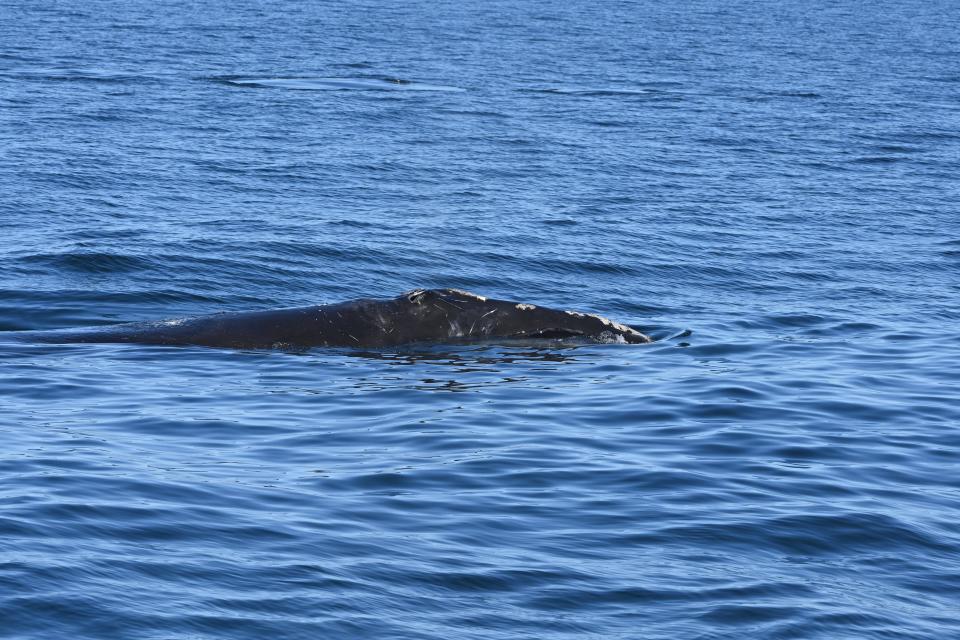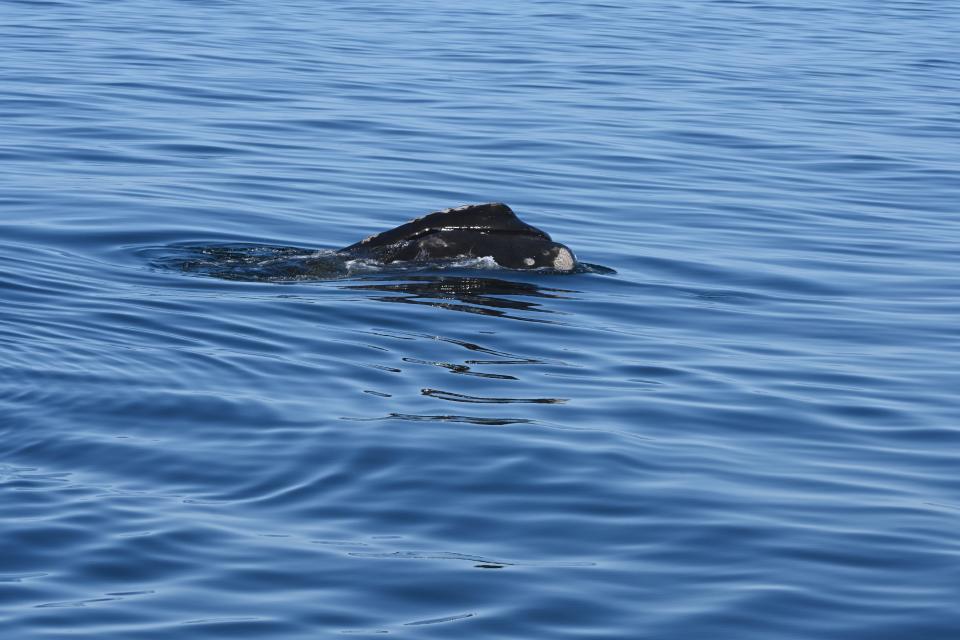Entangled right whale reported north of New England. Cape Cod rescuers standing by.
Another North Atlantic right whale has become entangled in traditional fishing gear and has scientists on the alert with hopes of helping her.
The whale, a female known as Shelagh, was spotted May 10, many miles from land in the Gulf of St. Lawrence, northeast of New Brunswick’s Acadian Peninsula and northwest of the Magdalen Islands, according to Fisheries and Oceans Canada.
The gear was entangled around her mouth, the agency said.
Shelagh is the first right whale to be sighted north of New England so far this year.
Right whales frequent Cape Cod Bay in the late winter and spring as part of their annual migration along the Atlantic coastline.

Canadian scientists observed the whale during a routine flyover of the area. The airplane surveys are similar to those undertaken by the Center for Coastal Studies in Provincetown and the New England Aquarium Anderson Cabot Center for Ocean Life to observe the critically endangered whales and other marine animals.
North Atlantic right whales off Cape Cod Less than 400 right whales remain worldwide. Many visit Cape Cod Bay. Meet eight of them.
New England scientists stand by, ready to help
Scientists in Provincetown and Boston are aware of the situation but aren't actively involved in the case at this point.
"Our response team has been alerted about the entangled right whale, and we're prepared to respond if she appears off the Cape," said Center for Coastal Studies Director of Communications Douglas Karlson in an email Tuesday.
The whale is free-swimming with her entanglement, "so she could appear anywhere" within the range of right whales, he noted.
"We do not yet know the type of gear that the whale is entangled in or where the gear came from," the Canadian agency reported Monday. "Identification of the gear type and its origin are typically only confirmed after investigation and when gear is removed from an animal, when possible."

Not the first entanglement for Shelagh
Shelagh, whose age is unknown, is listed in the North Atlantic Right Whale Catalog as right whale #4510. The catalog curated by the Anderson Cabot Center for Ocean Life at the New England Aquarium. She spends much of her time in the Gulf of St. Lawrence, in southern New England waters and off the coast of North Carolina but has also been known to visit Cape Cod Bay.
According to the New England Aquarium, she was observed in Cape Cod Bay on April 8 by researchers with the aquarium and the Woods Hole Oceanographic Institution, her last known sighting before her current entanglement.
New England Aquarium Senior Scientist Amy Knowlton noted that Shelagh has been entangled five times now, including two minor entanglements in 2015 and 2019. In 2017, she had attached gear in the Gulf of St. Lawrence and was successfully disentangled by a rescue team. In 2023, she had new severe entanglement injuries.
A challenging year for right whales so far
So far, 2024 has been a challenging year for North Atlantic right whales, which are at risk of extinction if deaths and injuries affecting their ability to thrive and reproduce continue. At least four right whales were confirmed dead along the East Coast this year, including a female who washed ashore on Martha's Vineyard in January. The tally doesn't take into account three newborn calves that have not been seen with their mothers since they were first spotted in southern birthing waters.
The latest population study, released last fall, placed the number of remaining right whales at 356, plus or minus seven, though this year's deaths and disappearances lower that estimate.
"The situation so far in 2024 for right whales highlights the fact that much more needs to be done to prevent the extinction of this species,” said Knowlton in March following the confirmed death of a female whale off the coast of Virginia, a mortality caused by a vessel strike.
Entanglements and vessel strikes are the leading causes of death for right whales. Survival of the species depends on no more than one whale death per year, according to NOAA Fisheries. Every loss brings the species closer to extinction, but female deaths are especially devastating because there are so few reproductively mature females left.
Shelagh, first sighted in 2015, is not known to have given birth yet. Right whales typically begin reproducing at about age 10.
Scientists hope to attempt disentanglement
Fisheries and Oceans Canada Marine Mammal Response Program is monitoring the situation with Shelagh.
"If the whale is located again, and weather and sea conditions allow, efforts will be made to attempt disentanglement," the agency said.
Heather McCarron writes about climate change, environment, energy, science and the natural world. Reach her at hmccarron@capecodonline.com, or follow her on X @HMcCarron_CCT
The Cape Cod Times is providing this coverage for free as a public service. Please take a moment to support local journalism by subscribing.
This article originally appeared on Cape Cod Times: Right whale Shelagh, visitor to Cape waters, seen entangled off Canada

